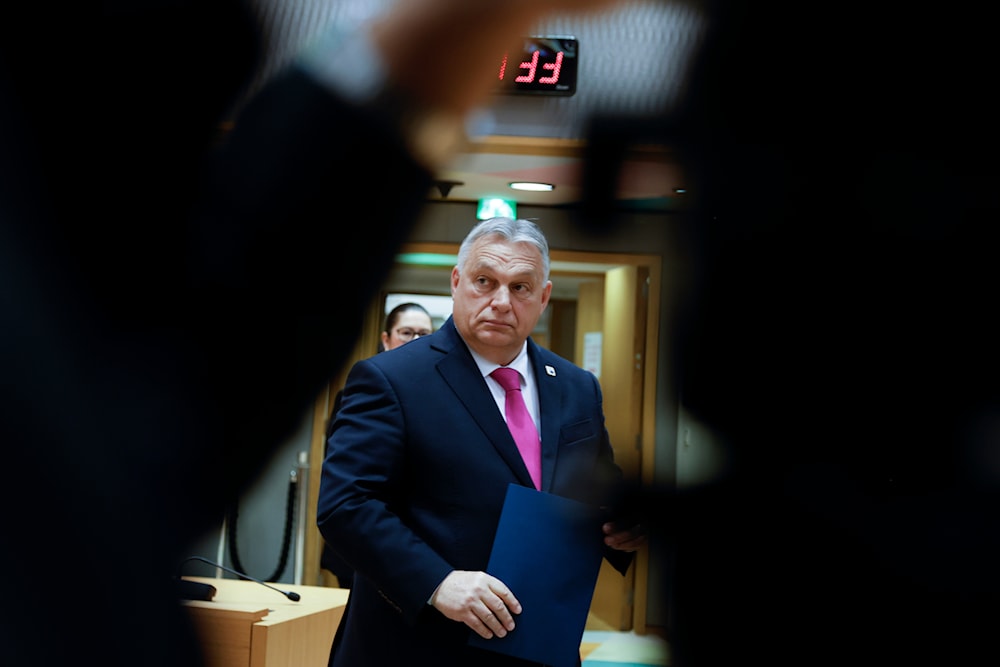Hungary vetoes 'senseless, irrational' Ukraine aid at EU session
Hungarian Prime Minister Viktor Orban opposes the aid on the basis that it should serve a shorter term, and that Ukraine has made insufficient progress in complying with EU-demanded reforms.
-

Hungary's Prime Minister Viktor Orban arrives for a round table meeting at an EU summit in Brussels, Thursday, December 14, 2023. (AP)
Following an intense session of the European Council in Belgium, Hungarian Prime Minister Viktor Orban announced on Friday that his country vetoed the EU's plan to supply tens of billions of euros in assistance to Ukraine, which followed his reported walk-out when other leaders voted for formal talks on Ukraine's bid to join the EU.
Presented by the European Commission, the plan aimed to amend the joint EU budget in which Brussels wanted to designate €50 billion ($54 billion) in spending over four years.
Hungary opposed it on the basis that aid should serve a shorter term and is pending renewal after review. Orban took to social media to affirm his veto of the proposal and review of the EU's long-term budget Multiannual Financial Framework (MFF).
In turn, the president of the European Council, Charles Michel, declared that after eight hours of debate, there was a green light for negotiations.
Read next: Hungarian truckers to hold protest on border with Ukraine
Orban described the decision as “completely senseless, irrational and incorrect,” and assured Hungary was not a part of it. He claimed in a video statement that “if the 26 [out of the 27 member states] decide to do so, they should go their own way.”
Starting accession negotiations with #Ukraine is a bad decision. Hungary did not participate in the decision. pic.twitter.com/omYLSxefkI
— Orbán Viktor (@PM_ViktorOrban) December 14, 2023
Treading carefully
One of the reasons behind the veto is Hungary's belief that Ukraine has made insufficient progress in complying with EU-demanded reforms.
"When I'm in the chamber, I don't feel the insurmountable desire for the Hungarian parliament to vote for Ukraine's membership of the European Union within two years. So I would be careful with these ambitious plans," Orban stated back in September.
However, as required by EU rules, the decision after Orban's walk-out was technically unanimous.
Michel still portrayed the outcome as a “historic moment that ensures the credibility and the strength of the EU.”
The European Council has decided to open accession negotiations with Ukraine & Moldova. #EUCO granted candidate status to Georgia. And the EU will open negotiations with Bosnia and Herzegovina once the necessary degree of compliance with the membership criteria is reached and…
— Charles Michel (@CharlesMichel) December 14, 2023
Read more: Aid to Ukraine has EU defense spending at record $260bln in 2022
During an interview with RIA Novosti in October, Hungarian Foreign Minister Peter Szijjarto announced that his country would veto the 12th sanctions package by the EU if it targets Russian gas, oil, or nuclear energy.
"In case there's anything which is against our national interest in the next package, we will definitely not agree with passing it. So red line for us obviously is energy, gas, oil, nuclear, and any other aspects which would harm our national economy," Szijjarto said, stressing that there is no need to still implement sanctions.

 3 Min Read
3 Min Read











